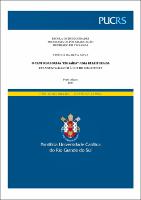| Share record |


|
Please use this identifier to cite or link to this item:
https://tede2.pucrs.br/tede2/handle/tede/10766Full metadata record
| DC Field | Value | Language |
|---|---|---|
| dc.creator | Paiva, Vinícius da Silva | - |
| dc.creator.Lattes | http://lattes.cnpq.br/5504930926005284 | por |
| dc.contributor.advisor1 | Fernandes, Rafael Martins | - |
| dc.contributor.advisor1Lattes | http://lattes.cnpq.br/2560189833702112 | por |
| dc.date.accessioned | 2023-05-18T20:11:18Z | - |
| dc.date.issued | 2023-02-27 | - |
| dc.identifier.uri | https://tede2.pucrs.br/tede2/handle/tede/10766 | - |
| dc.description.resumo | A presente dissertação de mestrado O Canto da Igreja “em saída” realiza uma releitura da Exortação apostólica Evangelii Gaudium à luz do Magnificat (Lc 1,46-55) em perspectiva eclesiológica. Na primeira parte, apresenta-se um estudo hermenêutico sobre a figura bíblica de Maria de Nazaré, sobre a narrativa da visitação (Lc 1,39-45) e o próprio canto do Magnificat. Na segunda parte, investiga-se a gênese e as raízes teológicas do pensamento do Papa Francisco. Trata-se de uma eclesiologia que valoriza o mistério da Encarnação, a fé inculturada, a vocação materna da Igreja e a piedade popular. Aprofunda-se os quatro princípios apresentados por Francisco na EG: o tempo é superior ao espaço; a unidade prevalece sobre o conflito; a realidade é mais importante que a ideia; e o todo é superior à parte. A dialética de Francisco é apresentada na pesquisa como “visão poliédrica da realidade”, através da qual, se torna possível superar a polarização, respeitando-se as diferenças. Na terceira parte, destaca-se o papel decisivo que o Espírito Santo exerce na eclesiologia de Francisco, quer seja na mística popular ou no caminho sinodal da Igreja. Busca-se, à luz do Magnificat, indicar aplicações da EG nas dimensões pastoral, social e planetária; e demonstrar que não há ruputra entre alegria e profecia, entre louvor e compromisso social. Aborda-se questões pastorais concretas e propõe-se a conversão ecológica e a evangelização inclusiva como caminhos pastorais para a Igreja “em saída” do século XXI. Ao final, com base na pesquisa realizada sobre a EG e o Magnificat, oferece-se, brevemente, algumas contribuições a respeito das comunidades eclesiais misionárias. | por |
| dc.description.abstract | This master’s thesis The Church’s Song “which goes forth” performs a re-reading of the Apostolic Exhortation Evangelii Gaudium in the light of the Magnificat (Lk 1,46-55) in an ecclesiological perspective. In the first part, a hermeneutic study is presented on the biblical figure of Mary of Nazareth, on the narrative of the visitation (Lk 1,39-45) and the song of the Magnificat itself. In the second part, the genesis and theological roots of Pope Francis’ thought are investigated. It is an ecclesiology that values the mystery of the Incarnation, the inculturated faith, the maternal vocation of the Church and popular piety. The four principles presented by Francisco in the EG are deepened: time is superior to space; unity prevailed over conflict; reality is more important than an idea; and the whole is greater than the part. Francisco’s dialectic is presented in the research as a “polyhedral view of reality”, through which it becomes possible to overcome polarization, respecting differences. In the third part, the decisive role that the Holy Spirit plays in Francis’ ecclesiology is highlighted, whether in popular mysticism or in the synodal path of the Church. In the light of the Magnificat, we seek to indicate applications of EG in pastoral, social and planetary dimensions; and demonstrate that there is no break between joy and prophecy, between praise and social commitment. Concrete pastoral issues are addressed and ecological conversion and inclusive evangelization are proposed as pastoral paths for the Church “which goes forth” of the 21st century. At the end, based on the research carried out on the EG and the Magnificat, some contributions are briefly offered regarding the missionary ecclesial communities. | eng |
| dc.description.provenance | Submitted by PPG Teologia ([email protected]) on 2023-04-27T20:20:28Z No. of bitstreams: 1 VINÍCIUS_DA_SILVA_PAIVA_DIS.pdf: 1278822 bytes, checksum: 9ee741f08d5cdaa2591b9f58f7f14320 (MD5) | eng |
| dc.description.provenance | Approved for entry into archive by Sarajane Pan ([email protected]) on 2023-05-18T20:09:10Z (GMT) No. of bitstreams: 1 VINÍCIUS_DA_SILVA_PAIVA_DIS.pdf: 1278822 bytes, checksum: 9ee741f08d5cdaa2591b9f58f7f14320 (MD5) | eng |
| dc.description.provenance | Made available in DSpace on 2023-05-18T20:11:18Z (GMT). No. of bitstreams: 1 VINÍCIUS_DA_SILVA_PAIVA_DIS.pdf: 1278822 bytes, checksum: 9ee741f08d5cdaa2591b9f58f7f14320 (MD5) Previous issue date: 2023-02-27 | eng |
| dc.description.sponsorship | Coordenação de Aperfeiçoamento de Pessoal de Nível Superior - CAPES | por |
| dc.format | application/pdf | * |
| dc.thumbnail.url | https://tede2.pucrs.br/tede2/retrieve/187512/VIN%c3%8dCIUS_DA_SILVA_PAIVA_DIS.pdf.jpg | * |
| dc.language | por | por |
| dc.publisher | Pontifícia Universidade Católica do Rio Grande do Sul | por |
| dc.publisher.department | Escola de Humanidades | por |
| dc.publisher.country | Brasil | por |
| dc.publisher.initials | PUCRS | por |
| dc.publisher.program | Programa de Pós-Graduação em Teologia | por |
| dc.rights | Acesso Aberto | por |
| dc.subject | Magnificat | por |
| dc.subject | Evangelii Gaudium | por |
| dc.subject | Papa Francisco | por |
| dc.subject | Igreja “em saída” | por |
| dc.subject | Magnificat | eng |
| dc.subject | Evangelii Gaudium | eng |
| dc.subject | Pope Francis | eng |
| dc.subject | Church “which goes forth” | eng |
| dc.subject.cnpq | CIENCIAS HUMANAS::TEOLOGIA | por |
| dc.title | O canto da igreja “em saída” : uma releitura da Evangelii Gaudium à luz do magnificat | por |
| dc.type | Dissertação | por |
| dc.restricao.situacao | Trabalho não apresenta restrição para publicação | por |
| Appears in Collections: | Programa de Pós-Graduação em Teologia | |
Files in This Item:
| File | Description | Size | Format | |
|---|---|---|---|---|
| VINÍCIUS_DA_SILVA_PAIVA_DIS.pdf | VINÍCIUS_DA_SILVA_PAIVA_DIS | 1.25 MB | Adobe PDF |  Download/Open Preview |
Items in DSpace are protected by copyright, with all rights reserved, unless otherwise indicated.




